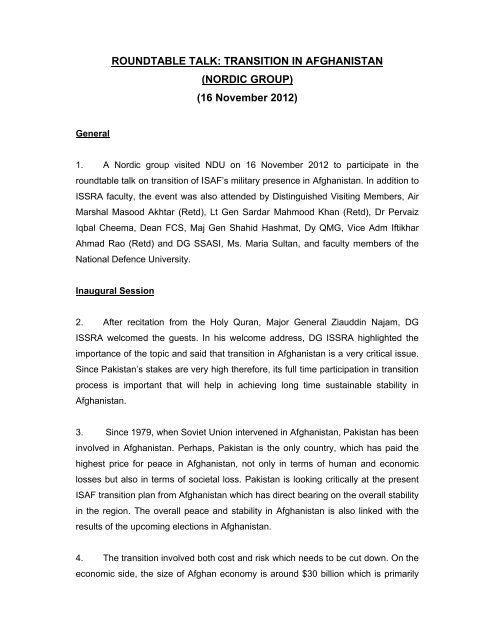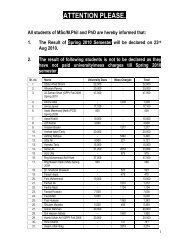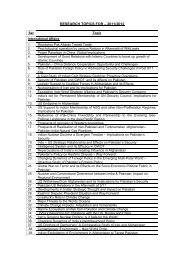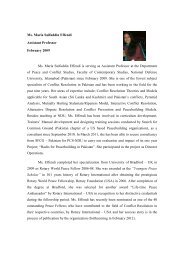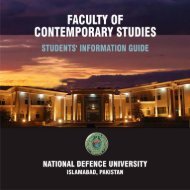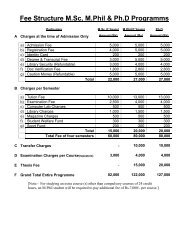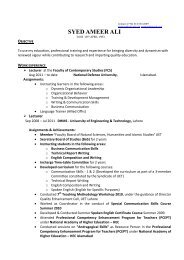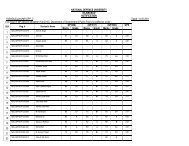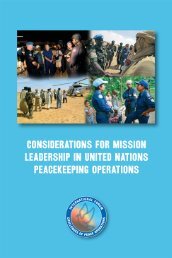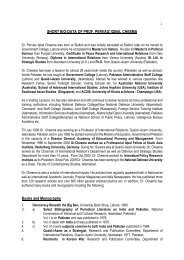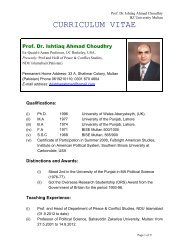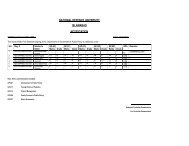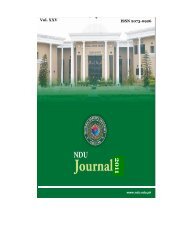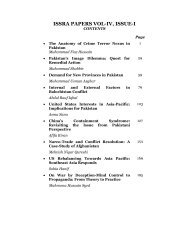TRANSITION IN AFGHANISTAN - National Defence University
TRANSITION IN AFGHANISTAN - National Defence University
TRANSITION IN AFGHANISTAN - National Defence University
You also want an ePaper? Increase the reach of your titles
YUMPU automatically turns print PDFs into web optimized ePapers that Google loves.
ROUNDTABLE TALK: <strong>TRANSITION</strong> <strong>IN</strong> <strong>AFGHANISTAN</strong>(NORDIC GROUP)(16 November 2012)General1. A Nordic group visited NDU on 16 November 2012 to participate in theroundtable talk on transition of ISAF’s military presence in Afghanistan. In addition toISSRA faculty, the event was also attended by Distinguished Visiting Members, AirMarshal Masood Akhtar (Retd), Lt Gen Sardar Mahmood Khan (Retd), Dr PervaizIqbal Cheema, Dean FCS, Maj Gen Shahid Hashmat, Dy QMG, Vice Adm IftikharAhmad Rao (Retd) and DG SSASI, Ms. Maria Sultan, and faculty members of the<strong>National</strong> <strong>Defence</strong> <strong>University</strong>.Inaugural Session2. After recitation from the Holy Quran, Major General Ziauddin Najam, DGISSRA welcomed the guests. In his welcome address, DG ISSRA highlighted theimportance of the topic and said that transition in Afghanistan is a very critical issue.Since Pakistan’s stakes are very high therefore, its full time participation in transitionprocess is important that will help in achieving long time sustainable stability inAfghanistan.3. Since 1979, when Soviet Union intervened in Afghanistan, Pakistan has beeninvolved in Afghanistan. Perhaps, Pakistan is the only country, which has paid thehighest price for peace in Afghanistan, not only in terms of human and economiclosses but also in terms of societal loss. Pakistan is looking critically at the presentISAF transition plan from Afghanistan which has direct bearing on the overall stabilityin the region. The overall peace and stability in Afghanistan is also linked with theresults of the upcoming elections in Afghanistan.4. The transition involved both cost and risk which needs to be cut down. On theeconomic side, the size of Afghan economy is around $30 billion which is primarily
2dependent on foreign aid. Around $15.7 billion alone comes through foreign militaryaid dedicated to improve Afghan <strong>National</strong> Security Forces (ANSF). What about thetraining of ANSF, is the force credible enough to maintain peace and providesecurity? These are serious questions which need to be addressed.Salient Features5. After the introductory remarks by DG, Air Marshal Masood Akhtar (Retd)made a brief presentation on “Afghan Transition- Implications for Pakistan”. The gistof his talk includes:-a. He began his talk by highlighting the importance of the topic especially inthe backdrop of Obama’s second term and opined that Obama’sadministration is going to be more decisive this time. He argued that theUS would leave sufficiently strong forces with regards to counterinsurgencyoperation inside Afghanistan and across Pak-Afghan border inthe form of drone attacks thus, more backlash and more difficulties for thepeople living across the Pak-Afghan border. He viewed that the US wouldwish to eliminate ‘Al-Qaeda’ and ‘Taliban’ to halt future attacks on theWest. With regards to the terrorists network like ‘Al Qaeda’, ‘AfghanTaliban’, ‘Punjabi Taliban’ and ‘Pakistani Taliban’, he said, we are notclear about their mission and, truly speaking, Pakistan has been put into aCatch-22 situation. While Pakistan continues to support ISAF effortshowever, these operations have tended to make things difficult forPakistan.b. During the course of his talk, Air Marshal Masood Akhtar (Retd)highlighted that the Counter Terrorism strategies of Nordic and Westcountries which involve both Kinetic and non-Kinetic means, focusing onwinning hearts and minds of Afghans. It gives a message that ideologycannot be destroyed; it might be contained for some time. When it comesto Pakistan, the emphasis is put on the use of only kinetic force which onlyhelps the extremists to gain more ground and puts the government in a
3difficult situation. Like the ISAF in Afghanistan, Pakistan too needs to winthis war. Thus, it is looking for a balanced Counter Terrorism Strategy. Hemade a point that if Pakistan fails, others may also not succeed.c. He emphasized that the success of the ISAF’s roadmap is linked withnumber of factors including the result of the ongoing negotiations,transparency in election process in Afghanistan, Pakistan’s ambitions,fears/expectations, the role of international community especially in thecontext of their sustainable economic support and the interests of otherregional stakeholders.d. He brought out three rationale on the basis of which Pakistan owe thiswar, one, it threatens Pakistani-Pakistan identity, second, it threatens its<strong>National</strong> Purpose that is Democracy, Freedom, Equality, Tolerance andSocial Justice (DFETS) and finally, it threatens its six suggested Vital<strong>National</strong> Interests (VNIs) i.e. national integration and harmony, defenceand security, economic well-being, favorable regional and global order,peoples’ security vis a vis state-security and promotion/affirmation of ournational values. On the other hand, VNIs of all Western nations inAfghanistan are to expand the defence and security parameters, benefitfrom the potential wealth of Afghanistan, containing China and promotionof national values.e. While suggesting the way forward, he opined that Pakistanis must beidentified with the same strategic ideals at the grand strategic level andboth ISAF and Pakistan should follow the same strategy. He said that likethe ‘Swedish <strong>National</strong> Security Policy on Preventing Terrorism’, Pakistanalso wished to incorporate the factors like openness, strengtheningdemocratic values and an open/ tolerant society in its Counter TerrorismStrategy in line with the rule of law. He suggested that internationalcommunity should trust Pakistan and quoted General Kayani’s statement,“Pakistan should be trusted and enabled”.
4f. The suggested Counter-Insurgency Strategy (diagrammatic layout atAnnexure A) which is based on policy strategy and aspiration is aboutends, ways and means. It aims to reconcile all groups into onehomogenous group. Counter-Insurgency strategy is to ‘SHAPE’ theenvironment that means Stop all Jehadi, Halt all Jehadi organizations,Amnesty, Pursue single minded operations and Enlist all who are ready tolisten in security forces.g. He pointed out the difference between Western and Pakistani strategiesand highlighted that Western strategy is more exclusive and Pakistanimore inclusive. Pakistan is fighting a war while the West is pre-empting thethreats. Challenges for Pakistan are both internal and external however,with regards to West, they have to deal with only external. He suggestedthat the role of international community in future of Afghanistan should beinclusive not exclusive of the Afghan government. The solution should notbe imposed from outside. The future scenario should look into the interestsof all nations particularly the interest of Pakistan which not only shares thecommon border but also common heritage with Afghanistan. Adestabilized Pakistan will not serve the purpose of anyone.h. At the end, Air Marshal Masood Akhtar (Retd) concluded that the Westmust not make us fight to protect their national interests and policies.Moreover, in Pakistan’s War against Terrorism, Pakistan should beenabled and trusted.Interactive Session6. A representative from Nordic countries initiated the interactive session andacknowledged that Pakistan is a true victim of war against terrorism. During thecourse of interactive session, there were number of questions related to Pak-Afghanistan relations were raised including Pakistan’s role in transition process aswell as in rebuilding Afghanistan. A Pakistani perspective of a possible role of Chinain Afghanistan also came up. The most critical question was related to Pakistan’s
5apprehensions about India’s presence in Afghanistan. Pakistan considers India’spresence in Afghanistan detrimental to its national security interest.7. During the session, it was pointed out that Pakistan is not supporting anti-American elements, as Pakistan is more concerned with putting its own house inorder. There was a consensus that both West as well as Pakistan should identifycommon ground/values in their grand strategies. In terms of Pak-Afghan relations,Pakistan needs to be more open and frank and take Afghanistan’s interests inconsideration while protecting its national interests. The cooperation extended byPakistan on Afghan government’s request to release some high profile Talibanmilitants is a positive sign. Pakistan’s offer to train Afghan <strong>National</strong> Army is anotherpositive gesture that can help improve trust level between the two countries.8. It was pointed out that Pakistan’s internal problems needs to be counteredwith different strategy. With regards to Afghanistan, Pakistan not only supports HighPeace Council but also encourages other encompassing approaches such asnegotiations with various Taliban factions. Pakistan believes that intra-Afghandialogue should be the top priority, involving credible negotiators led by Afghans.The symbolic release of prisoners from Pakistan is the evidence of credibility ofCouncil in facilitating the negotiations.9. Economic transparency is also one of the issues. There is a need to design amechanism to ensure accountability and transparency. Pakistan is still hosting morethan 1.649 million Afghan refugees. While Pakistan has provided scholarships to theAfghan youth but it is not sufficient. The educated Afghan refugees should also beconsidered in the future development of Afghanistan.10. With regards to the security of Pak-Afghan border, there is a disparity in theavailability and deployment pattern of the forces of the two sides. As compared toPakistan, ISAF is manning just few posts along the border. We need to understandthe reality, Taliban have not been defeated so they want to be treated as winners inthe negotiations process. Pakistan can play a decisive role in the peace processprovided, it is considered as part of solution.
611. Nordic participants pointed out that their countries are committed in thedevelopment efforts in Afghanistan. Moreover, there are no ulterior motives of Nordiccountries other than welfare and development of Afghanistan. However, it waspointed out that the possibility of a negotiated settlement of Afghanistan seemsunlikely, instead decision is being imposed from outside. Moreover, the mistrust alsoexists among the various Pakhtun ethnic groups.12. The point was also registered that the West should facilitate and encouragePakistan and India to reach on some kind of understanding so that they could alsojointly facilitate peace in Afghanistan instead of playing zero sum games. WhilePakistan would encourage the regional countries’ role however, it does haveapprehensions about the expanded role of India in its backyard.13. At the end, it was highlighted that because of the conspiracy theories whichcontinue to emerge frequently from different corner of the world, resultantly, there isan ambiguity about the role of different players in the post-2014 Afghanistanscenario. The West is also taking a narrow vision about the future of Afghanistan ashistorically, Afghanistan had rebuffed any unilateral effort by any state. Thus, infuture engagements, the three countries namely Iran, China and Pakistan should beincluded in the Afghan peace process.Concluding Remarks14. DG ISSRA in his concluding remarks said that in Afghanistan, there is ahistory of mistrust and short-term dealings. In 2001, Pakistan put across numbersuggestions to the US side. It was told not to go for war and instead find a diplomaticsolution to get Osama bin Laden. Pakistan was prepared to help the US. The USside was also told that they must make a distinction between ‘Al-Qaeda’ and‘Taliban’ and do not bind them together. It was also suggested to the US side thatshe should not become an occupation force. If an operation was required, it shouldbe short, swift and surgical.
715. After, more than a decade, the US has come to the same conclusions.Nevertheless, in the process, they have diverted their entire energies to demonizePakistan. While the US had been the longest and most popular ally of Pakistan butthese feelings are waning, American should find the reason why this happened. Thedecision of NATO/US to attack Afghanistan was a hasty decision, thus, the war wasinitiated on the wrong footing.16. Nevertheless, we need to look forward to make the transition process asuccess story. At the end, he thanked Nordic delegation for visiting NDU andexchanging views about Pakistan. He also thanked participants of the roundtable talkfor their extremely enlightened discourse with the distinguished guests.
8Annexure AProposed Counter-Insurgency Strategy of Pakistan


